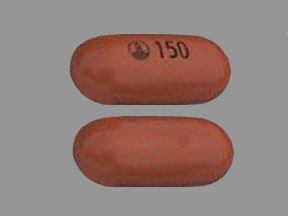Ofev Disease Interactions
There are 7 disease interactions with Ofev (nintedanib).
- Lung toxicity
- Arterial thromboembolism
- Bleeding
- Gastrointestinal perforation
- Hepatic impairment
- Renal impairment
- Smoking
Multikinase inhibitors (applies to Ofev) lung toxicity
Moderate Potential Hazard, Moderate plausibility. Applicable conditions: Interstitial Pneumonitis, Pulmonary Impairment
The use of certain multikinase inhibitors has been associated with pulmonary toxicity. Serious cases of interstitial lung disease (ILD), including fatal cases and interstitial pneumonitis or pulmonary fibrosis have been reported. Caution is recommended when using these agents in patients with a history of interstitial pneumonitis or pulmonary fibrosis or those patients presenting with acute onset of new or progressive unexplained pulmonary symptoms such as dyspnea, cough, and fever pending diagnostic evaluation. If ILD is confirmed, these agents should be permanently discontinued and appropriate measures should be instituted. Treatment should be immediately withheld in patients diagnosed with ILD/pneumonitis and permanently discontinued if no other potential causes of ILD/pneumonitis have been identified.
References
- (2011) "Product Information. Vandetanib (vandetanib)." Astra-Zeneca Pharmaceuticals
- (2011) "Product Information. Zelboraf (vemurafenib)." Genentech
- (2013) "Product Information. Mekinist (trametinib)." GlaxoSmithKline
- (2014) "Product Information. Zykadia (ceritinib)." Novartis Pharmaceuticals
- (2014) "Product Information. Zydelig (idelalisib)." Gilead Sciences
- (2015) "Product Information. Alecensa (alectinib)." Genentech
Nintedanib (applies to Ofev) arterial thromboembolism
Moderate Potential Hazard, Moderate plausibility. Applicable conditions: History - Thrombotic/Thromboembolic Disorder, Thrombotic/Thromboembolic Disorder, Ischemic Heart Disease
Arterial thromboembolic events, including myocardial infarction have been reported in patients taking nintedanib. It is recommended to exercise caution when treating patients at higher cardiovascular risk, including known coronary artery disease and to consider treatment interruption in patients who develop signs or symptoms of acute myocardial ischemia.
References
- (2014) "Product Information. Ofev (nintedanib)." Boehringer Ingelheim
Nintedanib (applies to Ofev) bleeding
Moderate Potential Hazard, Moderate plausibility.
Nintedanib may increase the risk of bleeding. Nintedanib should only be used in patients with known risk of bleeding if the anticipated benefit outweighs the potential risk. Close monitoring is recommended.
References
- (2014) "Product Information. Ofev (nintedanib)." Boehringer Ingelheim
Nintedanib (applies to Ofev) gastrointestinal perforation
Moderate Potential Hazard, Moderate plausibility.
Nintedanib may increase the risk of gastrointestinal perforation. Use caution when treating patients who have had recent abdominal surgery. It is recommended to discontinue therapy with nintedanib in patients who develop gastrointestinal perforation. Nintedanib should only be used in patients with known risk of gastrointestinal perforation if the anticipated benefit outweighs the potential risk. Care and close monitoring is recommended.
References
- (2014) "Product Information. Ofev (nintedanib)." Boehringer Ingelheim
Nintedanib (applies to Ofev) hepatic impairment
Moderate Potential Hazard, Moderate plausibility. Applicable conditions: Liver Disease
The use of nintedanib is associated with elevations of liver enzymes. Treatment with nintedanib is not recommended in patients with moderate or severe hepatic impairment. Patients with mild hepatic impairment can be treated with a reduced dose of nintedanib. It is recommended to conduct liver function tests prior to treatment with nintedanib and periodically thereafter as clinically indicated. Dosage modifications or interruption may be necessary for liver enzyme elevations as clinically indicated and according to medical practices.
References
- (2014) "Product Information. Ofev (nintedanib)." Boehringer Ingelheim
Nintedanib (applies to Ofev) renal impairment
Moderate Potential Hazard, Moderate plausibility. Applicable conditions: Renal Dysfunction
Based on a population pharmacokinetics analysis of nintedanib, exposure to nintedanib is not influenced by mild or moderate renal impairment. No dose adjustment is required in patients with mild to moderate renal impairment. Care and close monitoring is recommended when using this agent in patients with severe renal impairment and end-stage renal disease as the safety, efficacy, and, pharmacokinetics of nintedanib have not been studied these patients.
References
- (2014) "Product Information. Ofev (nintedanib)." Boehringer Ingelheim
Nintedanib (applies to Ofev) smoking
Moderate Potential Hazard, Moderate plausibility.
Smoking is associated with decreased exposure to nintedanib. Patients that are smokers might alter the efficacy profile of nintedanib. Encourage patients that are smokers to stop smoking prior to treatment because it might alter the efficacy profile of nintedanib and to avoid smoking while on therapy.
References
- (2014) "Product Information. Ofev (nintedanib)." Boehringer Ingelheim
Ofev drug interactions
There are 173 drug interactions with Ofev (nintedanib).
Ofev alcohol/food interactions
There is 1 alcohol/food interaction with Ofev (nintedanib).
More about Ofev (nintedanib)
- Ofev consumer information
- Check interactions
- Compare alternatives
- Pricing & coupons
- Reviews (16)
- Drug images
- Side effects
- Dosage information
- During pregnancy
- FDA approval history
- Drug class: multikinase inhibitors
- Breastfeeding
- En español
Related treatment guides
Drug Interaction Classification
| Highly clinically significant. Avoid combinations; the risk of the interaction outweighs the benefit. | |
| Moderately clinically significant. Usually avoid combinations; use it only under special circumstances. | |
| Minimally clinically significant. Minimize risk; assess risk and consider an alternative drug, take steps to circumvent the interaction risk and/or institute a monitoring plan. | |
| No interaction information available. |
Further information
Always consult your healthcare provider to ensure the information displayed on this page applies to your personal circumstances.


